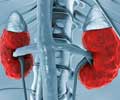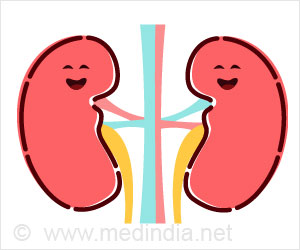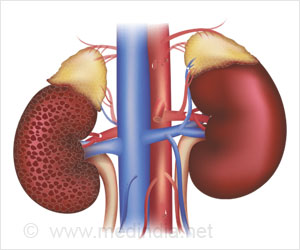New meta-analysis conducted recently enables better prediction of risk of adverse events in patients with severe chronic kidney disease (CKD G4) and improve patient outcomes.
- Recent meta-analysis aims to gain better insight into risk factors for adverse events in patients with chronic kidney disease (CKD) G4 and to optimize therapeutic interventions for best patient outcomes.
- There is huge variability in incidence of adverse events such as kidney failure, heart failure and death in CKD G4 patients and this may be a cause for suboptimal patient care and outcomes.
Aim of Meta-analysis
The main aim of the recently conducted meta-analysis was to improve outcomes in patients with CKD G4 or more by better prediction of the risk of adverse events and customizing treatment interventions on the basis of each patient’s needs and health status. Details of Meta-analysisThe meta-analysis of risk factors for kidney replacement therapy (KRT), cardiovascular disease (CVD) events, and death included 28 cohorts (n = 185,024). The risk prediction meta-analysis included 29 cohorts (n = 264,296).
The Key Findings of Meta-analysis to Predict Risk of Adverse Events
- The main findings concluded that established risk factors for CVD were highly applicable in CKD G4+ patients as well, but their relative importance varied according to outcome.
- Age and history of CVD were inversely related to risk of kidney replacement therapy but positively associated with risk of CVD and death.
- Current smoking showed the strongest association to death.
- Blood pressure showed positive association with KRT risk but showed a U-shaped relation with CVD and death.
- Diabetes and male sex were important risk factors for all outcomes but most significant for CVD and KRT, respectively.
- Black race showed positive association to need for KRT.
- Lower values of estimated GFR (eGFR) and increased albumin-to-creatinine ratio (ACR) were more strongly associated with KRT compared to other adverse events.
- Time-varying CVD events and initiation of KRT were strongly associated with subsequent occurrence of death.
Kidney Disease: Improving Global Outcomes (KDIGO) Controversies Conference
The key results from the global meta-analysis were presented to an international expert panel at a KDIGO Controversies Conference in December 2016, and the implications of these findings for patient management were discussed. The various points discussed included:- Holistic management strategies of patients with CKD G4+
- Diagnostic and treatment challenges of heart failure in CKD G4+ and forming guidelines to overcome these
- Importance of shared decision making before starting KRT
- Optimization of clinical trials in CKD G4+ patients.
Important Points to be Noted In Models of Care of CKD G4 Patients
CKD patients require a multidisciplinary approach system with seamless integration of the various aspects of care in order to ensure the most optimal outcome- Patient-orientated care and patient involvement in decision making should be a key priority.
- Classify CKD according to cause of kidney disease, GFR values, and severity of albuminuria.
- Estimate risk and prognosis of each patient individually and optimize management and timing of KRT accordingly.
- Measures to avoid acute kidney injury and prevent CKD progression where possible.
- Assessment and management of co-morbid conditions, in particular presence of ischemic heart disease, heart failure, and prevention of stroke.
- Timely diagnosis and management CKD-specific complications (e.g., malnutrition, bone disease, anemia, and acidosis) and their prevention.
- Plan and prepare replacement therapy for treatment of kidney failure (e.g., choice of dialysis, access-placement and care, pre-emptive kidney transplantation) as per patient’s needs and condition and provision of conservative care and palliative care options where required.
- Ensure that adequate psychosocial support is provided to patients and their families.
- Maintain continuity across different specialties under which patient is being treated.
- Ensure all communication channels are open - CKD care program to patient and/or carer; between various CKD team members; and between CKD team and other care personnel.
Importance of Conducting Clinical Trials in CKD G4 Patients
The meta-analysis findings suggest the importance and urgent need to design, conduct and complete quality clinical trials in patients with CKD, including CKD G4 patients as well. This would be especially beneficial with potential economic advantages of preventing kidney failure, CVD events and death in this population.What is Chronic kidney disease (CKD)?
Chronic kidney disease (CKD), refers to a persistent decrease in Glomerular Filtration Rate (GFR) (GFR measures the ability of the kidneys to filter out waste and toxins) along with other signs of kidney damage, and is further classified based on GFR values and severity of albuminuria (excretion of albumin in urine).Persons with a GFR below 30 ml/min per 1.73 m2 (i.e., CKD G4 or G5) are especially high risk across all albuminuria categories. People with CKD G4+ are at increased risk for kidney failure, recurrent hospitalizations, CVD events, death, and often overlooked conditions such as cognitive impairment, falls, severe disabilities and infection.
Conclusion:
Patients with CKD G4+ represent a high-risk population needing specialized care and expertise under nephrologists and other specialists. Despite severely impaired GFR, the prognosis of CKD G4+ patients is highly variable often resulting in suboptimal treatment.
The newly developed risk prediction tool specific for CKD G4+ may enable better prediction of adverse outcomes and appropriate individualized management. This information can also be factored in while making decisions on patient follow-up, CVD risk reduction, and optimal timing of KRT. The variable prognosis of patients with advanced CKD mandates individualized, risk-based management,
Reference:
- Kai-Uwe Eckard, Nisha Bansal, Josef Coresh, Marie Evans, et.al. Improving the prognosis of patients with severely decreased glomerular filtration rate (CKD G4+): conclusions from a Kidney Disease: Improving Global Outcomes (KDIGO) Controversies Conference, kidney international (2018). DOI: https://doi.org/10.1016/j.kint.2018.02.006
Source-Medindia
















